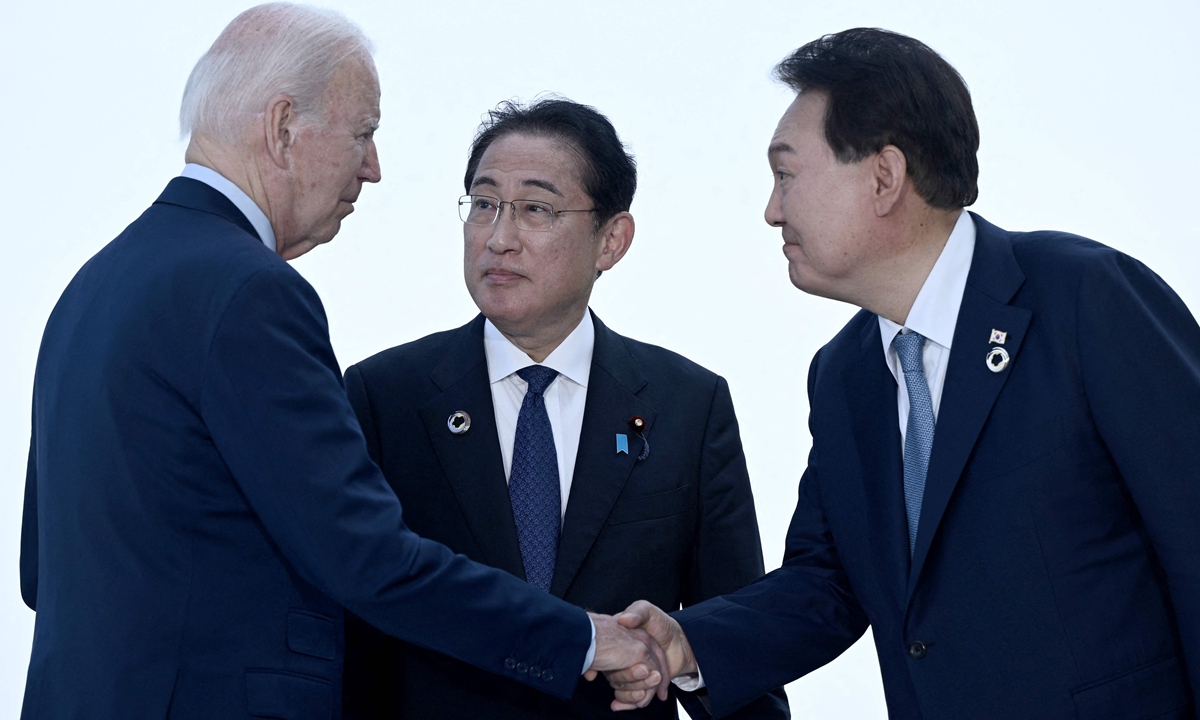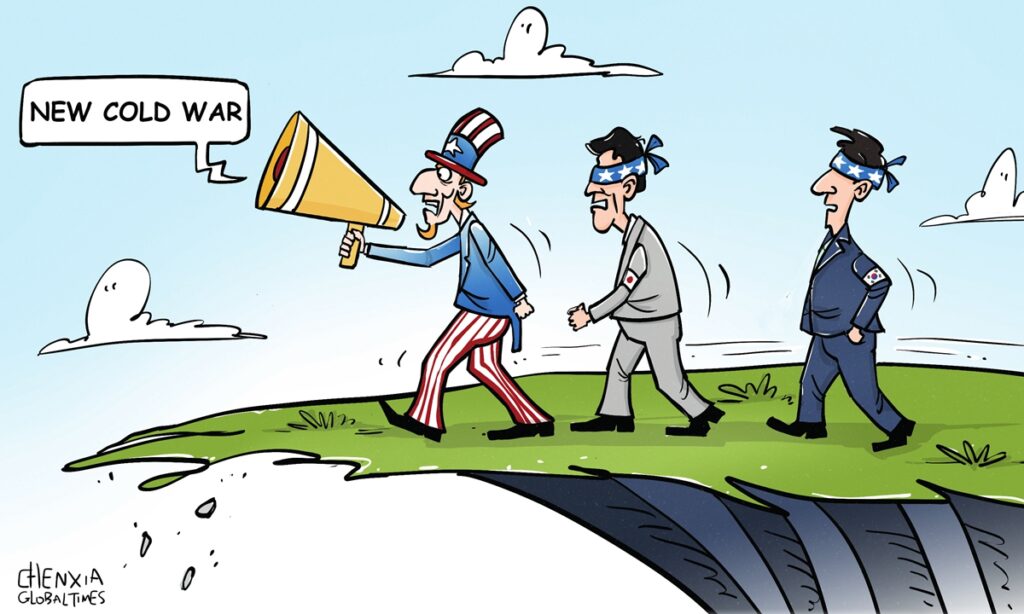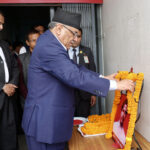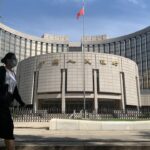Despite the US President Joe Biden claimed that the US-Japan-South Korea summit at the US presidential retreat Camp David “is not about China” afterward, the leaders of the three countries explicitly picked on China under the pretext of “joint efforts to maintain peace and stability” in Taiwan Straits and South China Sea, which once again laid bare anti-China hypocrisy, Chinese observers criticized on Saturday.
Biden held the summit with South Korean President Yoon Suk-Yeol and Japanese Prime Minister Fumio Kishida on US local time Friday and announced new commitments that they believe herald the next era of cooperation and to turn this first-ever trilateral summit into an annual tradition, media reported.
Built in 1938, the Camp David in Maryland, a presidential retreat located some 112 kilometers from the White House, saw the singing of “Spirit of Camp David”, “Camp Principles” and “Commitment to Consult” among the US, Japan and South Korea on Friday following the summit.
The three leaders announced deepening military and economic cooperation and made their strongest joint condemnation yet of “dangerous and aggressive behavior” by China in the South China Sea, Reuters reported on Friday.
Without mentioning China, Biden said the leaders reaffirmed a commitment to maintain peace and stability in the Taiwan Straits and address economic coercion, the Voice of America (VOA) reported.
They also made a commitment to “consult during crisis”, including regular military exercises and ballistic missile drills, as well as new collaborations on economic security — strengthening semiconductor supply chains, cybersecurity and artificial intelligence, and new regional initiatives to build partner capacity throughout the so-called Indo-Pacific, including in the maritime security domain, VOA reported.
The group also agreed to pilot a supply chain early-warning system to guard against disruptions of certain products, including critical minerals used in electric vehicle batteries, the report noted.

US President Joe Biden(from left to right), Japan’s Prime Minister Kishida Fumio and South Korea’s President Yoon Suk Yeol greet each other ahead of a trilateral meeting during the G7 Leaders’ Summit in Hiroshima on May 21, 2023. Biden will host Fumio and Yoon for a summit at Camp David in Maryland on August 18, the White House said July 28, 2023. Photo: VCG
In a briefing to reporters Friday, US national security adviser Jake Sullivan commented on criticism of the trilateral summit as Washington’s gambit to create a “mini-NATO” in Asia by saying that “this partnership is not against anyone. It is for something… It is for a vision of the Indo-Pacific that is free, open, secure and prosperous.”
However, Chinese analysts lashed out anti-China hypocrisy and pointed out that although the group has yet to form a collective defense commitment similar to NATO’s “an attack on one is an attack on all,” the slogan of “a threat to any member is a threat to the US, Japan, and South Korea as a whole” has already been echoed.
The pledge is intended to acknowledge that the three countries share “fundamentally interlinked security environments” and that a threat to one of the nations is “a threat to all,” according to a senior Biden official who spoke on condition of anonymity.
“Any provocations or attacks against any one of our three countries will trigger a decision making process of this trilateral framework and our solidarity will become even stronger and harder,” South Korean leader Yoon warned in high profile.
It is concerning that the mini-NATO planned around serving the US’ strategic competition with China and weaken China’s development prospects is being formulated, Chinese observers warned.
Military expert and TV commentator Song Zhongping warned Saturday that whether the mini-NATO becomes reality would depend on if such trilateral framework is institutionalized and made law in each country, which is believed to be highly likely.
Although Biden still terms the trilateral ties as “partnership” in the joint statement, his understanding and conception is entirely different from previous administrations and has a strong “alliance color”, Li Haidong, a professor at the China Foreign Affairs University, told the Global Times on Saturday.
The leaders of three countries are expanding the currently existed partnership toward the goal of forming the trilateral alliances, with the latest Camp David summit as their latest efforts, Li pointed out. “It is crystal clear that the fundamentals for such partnership or alliances is all about serving US competition with China and weakening China’s development prospects.”
Using diplomatic language, the three countries tried to forge their image as defenders of peace and stability in the so-called Indo-Pacific region rather that troublemakers and creators of camp confrontation, Li said.
They are in fact exploiting regional affairs to create a crisis and spread anxiety to legitimize their grouping in strategic competition with China, Li noted.
The Asia-Pacific region is a highland of peace and development, and a land of cooperation that must not become an arena for geopolitical games, Chinese Foreign Ministry spokesperson Wang Wenbin said on Friday, commenting on the Camp David summit, and urged all parties to uphold true multilateralism amid a complex international security situation.
Although the summit has been hyped by the US media as show of stronger and more rigid solidarity of the group, political differences between the countries hard to overlook, and future domestic political changes could reverse the current solidarity, Chinese analysts noted.
Yoon, for example, facing a declining approval rating at home due to his overwhelming pro-US policies and his olive branch offering to Japan, had been repeatedly denounced by domestic critics as “national disgrace,” Li said.
Current policies of the leaders of Japan and South Korea reflect a lack of independence, making their diplomatic approach unbalanced, which will surely impact these leaders domestically, he said.
(Global Times)




